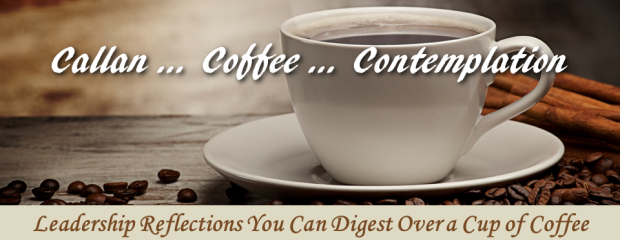Callan…Coffee…Contemplation for the Week of April 28th
Hardiness
In watching the news I’ve become aware we are becoming a more fragile people; easily bruised, readily offended, and lacking in healthy confidence. So today I am contemplating hardiness; what is it that makes individuals, and groups, resilient? I believe the answer is mental toughness–knowing you can take a hit, move through the pain and be transformed by it, and then bounce back without sacrificing your honor, virtue, and courage. Mental toughness—the ability to focus, operate under duress, and press through pain thresholds—is both a state of mind and a habit. So, what is the lesson in this for leaders? We must develop mental toughness in ourselves first, and then cultivate it in those we lead. And the benefit if we do? We transform ourselves from fragile, brittle, easily-offended people into resilient, confident, and hardy folk who understand there is such a thing as necessary suffering and, if we endure suffering heroically, the abyss actually transforms our raw elements into gold.
Feeling Our Past in the Wind
I am often asked why I use myth, legend, lore, and history in almost all of my leadership teaching. A valid question, for it is easy to believe today, given the exponential speed of change and the globalizing effect of interconnected economies, that history doesn’t matter any more. I disagree. Great cultures have always had at their core a deep, vibrant, and acute awareness of their perennial knowledge–where they came from; how they got here; on whose example they relied for heroic guidance; and the rejuvenating wisdom that flowed from this broad arc of perspective. I equate this sense of history as being able to feel our past in the wind. Yes, we still move forward into the future and towards the horizon; however, as we do march forward we remain respectful of our part in the greater patterns to which we belong and on which we rely for wisdom. We need to remind ourselves via this historical lens that, yes, we have been here before, and yes, we can succeed again. Great leaders study history, uncover its patterns, and confidently feel their past in the wind.
Tuning Out
If I detach for a moment and observe the normal frenzy around me I become acutely aware how hyper-stimulated we are as a people and a society. 24-hour news cycles, cell phones that never power off, sound bites that drone across the web page, and a torrent of text messages and tweets. I raise this observation not to criticize technology. It is amazing, yes. However, I don’t believe deep insight, wisdom, or elevating leadership ever emerged from such a state of over stimulation. Hyper-stimulation only produces episodic reality—a state of being where right here, right now, is worthy of attention only until the next tweet rolls in. Is this stimulation fun? Maybe, yes. Is it capable of calling forth great leadership? No. I believe history teaches us that self-mastery, transformation, and genuine growth actually comes from silence and contemplation; from being under-stimulated. It is in occasional solitude that deep thoughts emerge, penetrating insight becomes possible, and wisdom reveals itself. So I remind myself daily: power off and tune out to make room for insight, thinking, and reflection.
Boundaries and Limitations
One of the truths I believe we are rediscovering after more than a half-century of “If it feels good, just do it” is the absolute need for healthy boundaries and limitations in the maturation of youth. It is essential we provide young leaders solid boundaries such as a clear sense of identity, a reverence for tradition, and an appreciation for self-discipline and personal accountability. Though it may feel good to begin without such boundaries, what our generation, who came of age in the 60’s and 70’s, knows all too well is a lack of boundaries just creates a lot of aimlessness and reactionary living. Just ask my dad about me! This is why I have always loved mythology and hero tales because these archetypal stories always show the hero starting out with firm boundaries and solid limitations (he’s an idealist at heart), and it is only when he is ready for the quest, and transformed by it, that he is able to move into a world of nuance and less boundaries. The hero needed early boundaries to prepare him for a later life of wisdom. Wise leaders must set boundaries and limitations to likewise guide the ascent of their emerging leaders.
Healthy Traditions
In my youth I had little interest in, or patience for, traditions. Instead, my gaze fell mostly upon the ladder I was climbing while pursuing my personal ambitions. Though surrounded with lots of healthy traditions—family rituals, church rites, sports icons, and later, the rich ethos of the US Marine Corps—it wasn’t until later I came to appreciate the role of traditions in my life. Traditions are not some pesky, antiquated leftovers from a by-gone era; they are the vibrant reminders of deep wisdom and enduring truth. Healthy traditions guide us as more effectively than any modern signpost we could create because traditions help move us from the circumference of life to the center of meaning. Moreover, healthy traditions convey a sense of timeless authority, helping us see a trustworthy bond linking generation to generation. Consider for an example this simple yet eminently powerful tradition: the family dinnertime meal. Healthy traditions teach, they instruct, and they inform, and when activated purposely by leaders, traditions give us a sense of belonging to something greater than ourselves.
Check back next Monday for a round up of this week’s social media shares. Or check us out on Facebook, Twitter, Google+, or Pinterest to see our posts every day!
Tweet Share






